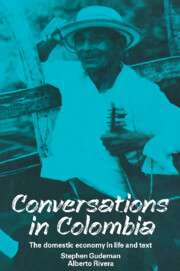8 - THE HOUSE AND THE MARKET
Published online by Cambridge University Press: 03 October 2009
Summary
The house economy exists within a political and legal framework that defines how access to property is gained, and it is located within a market system characterized by the unequal control of wealth. This structural placement has an important impact on its functioning, for the rural areas of Colombia are penumbral to the use and concentration of capital, and the house must survive in the spaces left empty by profit-seeking organizations. There is a dramatic asymmetry between the power of the corporation and that of the house. Corporations move within the market, extending it and using it in their project of turning a profit. The house cannot. As the people say, it is “a struggle, a fight,” to maintain the house, which is always “in the making.” Even haciendas perpetually struggled to maintain and enlarge themselves only to dissolve under the impact of the market.
The way that the house economy fits into the larger market world is variantly voiced, for the house conversation lacks unity (although it echoes one that goes back to Aristotle), while the corporate discussion, inscribed in texts, models exchange yet differently. But these several conversations illuminate processes at the periphery and even hint at ways to alleviate certain modern struggles. An examination of the coexistent models and of their conjuncture through trade reveals what is happening in markets at the periphery: the picture gained is very different from current theory.
- Type
- Chapter
- Information
- Conversations in ColombiaThe Domestic Economy in Life and Text, pp. 139 - 159Publisher: Cambridge University PressPrint publication year: 1990



